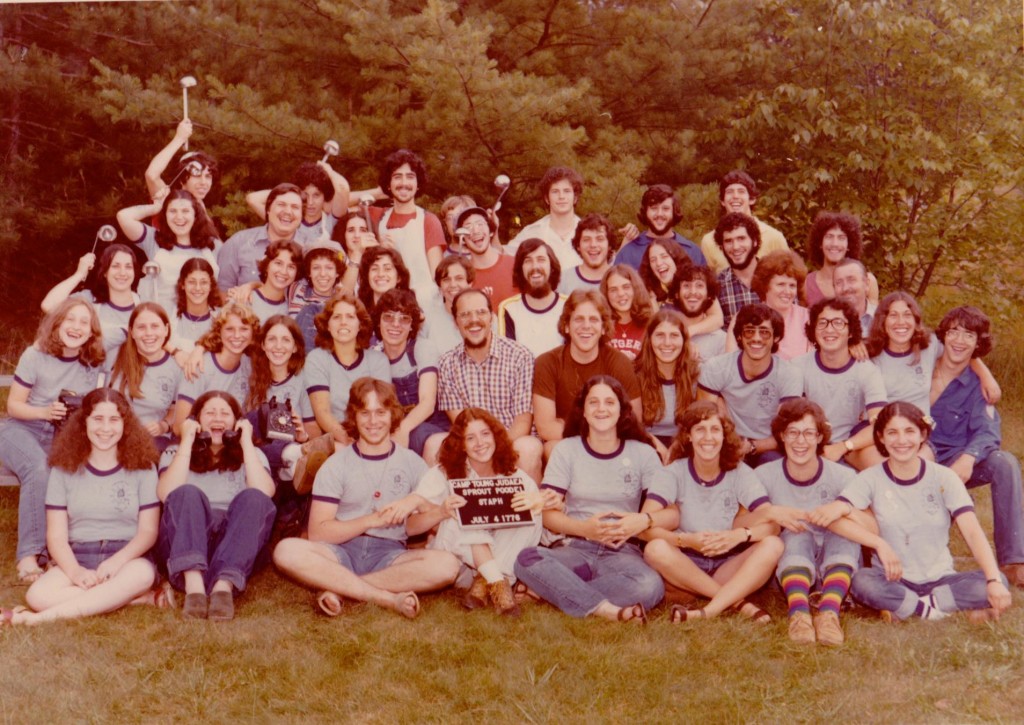Gershon Baskin believes that even if the official negotiations don’t begin, “economic peace” plans can have a positive political dimension. Netanyahu should adopt these and other steps that will demonstrate that Israel is interested in seeing a viable and successful Palestinian state as a good neighbor.

Gershon Baskin (Top Row, Second from Right in Blue Shirt) with the Camp Young Judaea Sprout Lake (Staff, — with Janice Isaac, Toby Fischer Morse, Larry Warmflash, Bob Belkin, Judy Schwartz Rodenstein, Michael Horowitz, Amy Drogin Schwartz, Alan Queen, Aron Kaufman, Wayne Horowitz, Andrea Molod, Gershon Baskin, Rebecca Fox, Sheri Fogel Dubiner, Ethan Halpern and Susan Altman. Photo take on July 4, 1976 in Verbank, NY, USA.
My activism goes back to my childhood, when I started as a supporter of the Vietnam anti-war movement and an advocate for civil rights. I was inspired by Sen. Eugene McCarthy and New York Congressman Allard Lowenstein. As a teen I joined and rose to leadership roles in Young Judea, the Zionist Youth Movement of Hadassah. All the while, I felt a deep need to integrate my involvement in progressive causes here in the states with my heartfelt connection to Israel and belief in Zionism. From the time I immigrated to Israel as a 22 year old, I have been involved in efforts to foster understanding between Arabs and Jews in the public and private sectors. Even in the military, I helped to introduce education for coexistence into the National College for the Training of Officers and continued this work during 15 years of reserve duty.
After the start of the first Palestinian intifada, I founded the Israel/Palestine Center for Research and Information, which has been my life’s work for the past 21 years. It’s from this vantage point that I view the current efforts at peace by the Israeli and Palestinian governments.
Prime Minister Netanyahu campaigned on the slogan of “economic peace” and said he would help the Palestinians build their state from the bottom up by strengthening their economy.
In August 2009, Prime Minister Salam Fayyad presented his own plan for Palestinian state-building. “Ending the Occupation, Establishing the State” is a detailed plan for developing the institutions of the Palestinian state.
From an Israeli point of view, most of the Fayyad proposal should be warmly welcomed. Israel has said over and over again that the Palestinian Authority should learn from Israel’s pre-state days of Ben-Gurion. By the time Israel was established 62 years ago, the infrastructure for statehood was in place.
This is precisely what Fayyad is doing. The Palestinian Authority is launching new projects every week. A lot of attention is placed on modernizing laws, building a functioning legal and court system and rooting out corruption as well as jump-starting the economy and collecting taxes.
Netanyahu says he is convinced the economic peace plans can be advanced. To do that, he should take steps that will have a real impact on emerging Palestinian institutions and perhaps set the stage for peace negotiations.
He has removed key checkpoints around the West Bank, but hundreds of roadblocks still exist. Most of these can come down now with minimal security risks. Opening the roads and allowing free movement are key to any economic development.
Beyond just restoring law and order, the Palestinian Authority security forces are engaged in counter-terror activities. The Fayyad government has succeeded in changing the security discourse from “providing security to Israel,” which implies collaboration with the occupation, to “developing mutual security,” which says security is in both people’s interests.
In practice, this means the Israel Defense Forces should cease incursions into areas controlled by the Palestinian Authority except where the IDF has specific and real-time intelligence information that terror activities are taking place.
Israel should approve Palestinian requests to build new cities in the West Bank. This can only be done in Area C, where Israel is in full control. There are no land reserves anywhere else. Imagine how two cities of 100,000 people each being built there would propel the economy, offer opportunities for investment and create thousands of jobs.
Even if the official negotiations don’t begin, “economic peace” plans can have a positive political dimension. Netanyahu should adopt these and other steps that will demonstrate that Israel is interested in seeing a viable and successful Palestinian state as a good neighbor.

